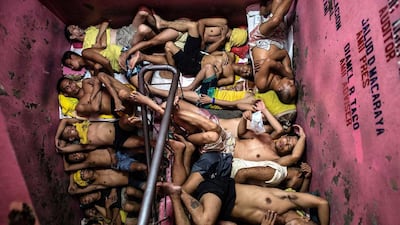MANILA // Mario Dimaculangan shares a toilet with 130 other inmates in one of the Philippines’ most overcrowded jails, and conditions are getting worse as police wage an unprecedented war on crime.
Security forces have killed hundreds of people and detained thousands more in the month since president Rodrigo Duterte said the top priority at the start of his six-year term was to eliminate drugs in society.
Those detained appear doomed for lengthy stints in an underfunded and overwhelmed penal system.
Dimaculangan has spent 14 years in the Quezon City Jail while his trial over murder and robbery charges has dragged on.
“Many go crazy. They cannot think straight. It’s so crowded. Just the slightest of movements and you bump into something or someone,” he says, sitting in one of the jail’s packed hallways that reek of sweat.
There are 3,800 inmates at the jail, which was built six decades ago in a northern district of the Philippine capital to house 800, and they engage in a contest for space.
Men take turns to sleep on the cracked cement floor of an open-air basketball court, the steps of staircases, underneath beds and hammocks made out of old blankets. Even then, bodies are packed like sardines in a can, with inmates unable to fully stretch out.
The conditions are even worse when it rains because the prisoners cannot sleep on the basketball court, which is surrounded by the cells in decaying concrete buildings up to four storeys high.
The cash-strapped national government has a daily budget of 50 pesos (Dh3.90) for food and five pesos for medicine per inmate, although with the bulk buying of supplies, Quezon City Jail’s detainees have a sustainable diet of soup, vegetables and meat.
Pails of water are used to flush the scarce toilets, with the stench compounded by the rotting rubbish in a nearby canal.
The jail’s management does what it can to make life bearable, such as running dance competitions and other activities.
Inmates said there have been improvements in recent years, particularly with the food and an increase in rehabilitation programmes.
But Raymund Narag, a criminal justice scholar at the Southern Illinois University in the United States, said such conditions were unthinkable in western nations.
“If this happened in America, there would be a riot every day. Courts would declare these jails unfit for human habitation,” Mr Narag.
The Philippine penal system is the third-most congested in the world, according to the University of London’s Institute for Criminal Policy Research.
The country’s jails hold nearly five times more prisoners than they were built for, according to government data.
And the situation is likely to get much worse, very quickly.
Under Mr Duterte’s crime war, police have reported arresting more than 4,300 people for drug-related crimes since he took office on June 30.
The president has repeatedly urged his law enforcers to do more, calling on them to triple their efforts to eradicate the drug menace that he said was threatening to turn the Philippines into a narco-state.
The population of Quezon City jail, which houses inmates who are on trial but not yet convicted, has grown by 300 since Mr Duterte won May elections.
Justice secretary Vitaliano Aguirre said the government was preparing sites for new prisons while courts have been ordered to prioritise the expected deluge of drug cases.
But Mr Duterte has said little about far-reaching reforms needed to fix the systemic problem of overcrowding.
“If there are no new jails, no budget increases, no additional courts and prosecutors, the system will explode. That will be a humanitarian crisis,” said Mr Narag.
He spoke from personal experience. Now 41, he was locked up in Quezon City Jail in 1995 as a 20-year-old after being accused of killing a student from a rival college fraternity.
It took seven years for a court to acquit him, which is about the average length of a trial in the Philippines and one of the main drivers of the overcrowding problem.
Dimaculangan is the longest-serving inmate in Quezon City Jail, after being charged with killing a politician’s relative in 2001. Dimaculangan is a pseudonym, because his real name cannot be used for legal reasons.
He insisted he had a “clear conscience” but cannot get a chance to prove his innocence in court, averaging one trial hearing a year in a chaotic judicial system with its lack of judges, publicly funded lawyers and court rooms.
Dimaculangan said his spirits used to rise when he was informed of a date for a court hearing, but he had been disappointed too many times with cancellations or postponements.
“Now when they say I have a hearing, I don’t care anymore,” he said.
With no hopes of freedom, Dimaculangan said he had turned to his Catholic faith and values.
“My purpose is to help my fellow detainees,” he said.
“God did not send me here because I am a thief. There are many thieves out there but how come they are not in jail?”
* Agence France-Presse

